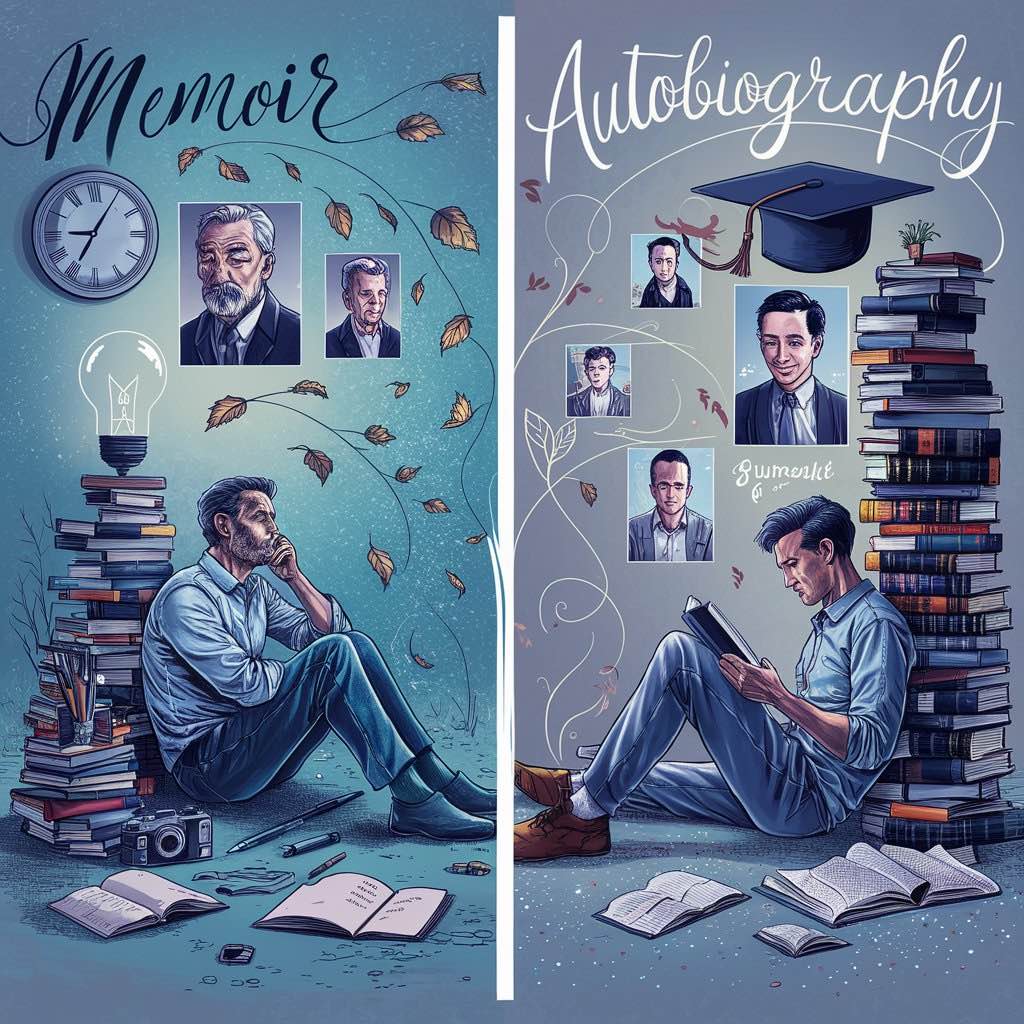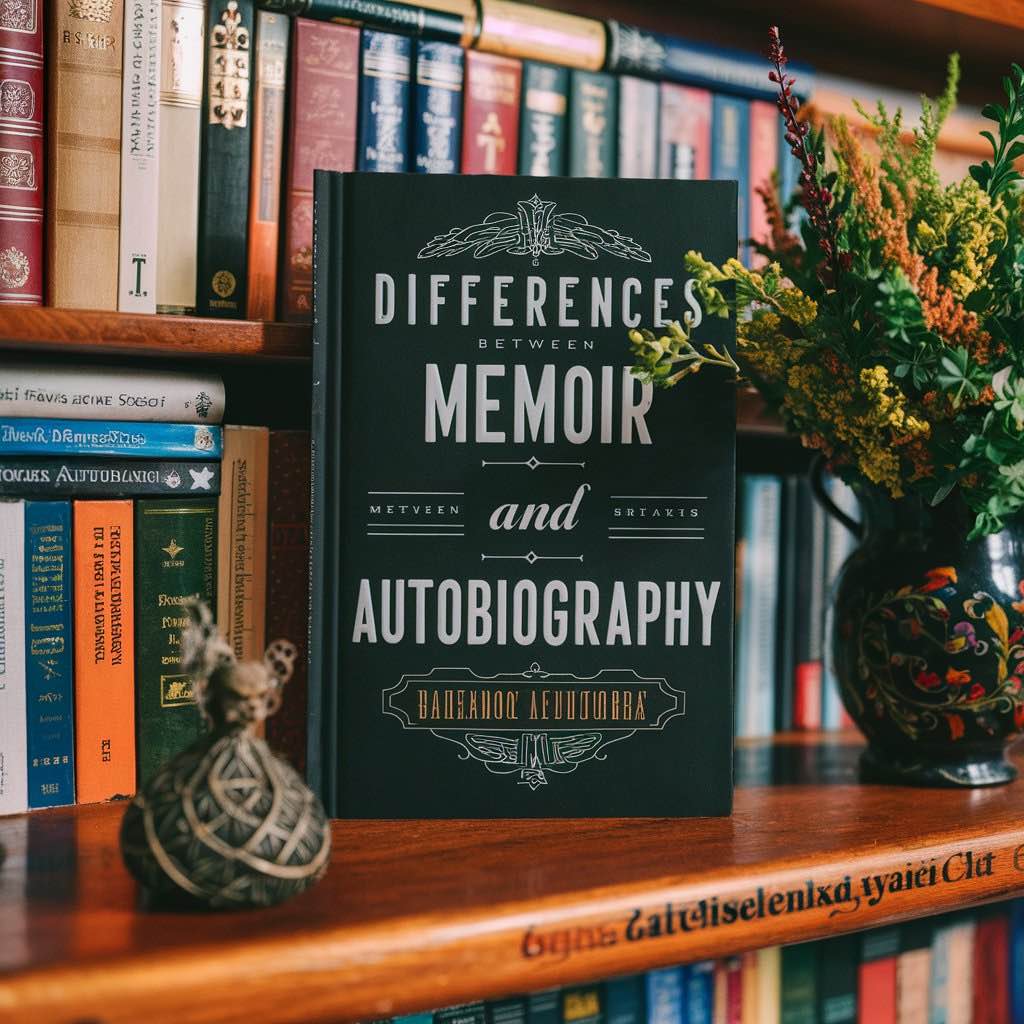A memoir is a narrative, written from the perspective of the author, about an important part of their life. It’s often conflated with autobiography, but there are a few important differences. An autobiography is also written from the author’s perspective, but the narrative spans their entire life.
When it comes to reading about one’s life, many people are confused between a memoir and an autobiography, though they hold distinct differences.
A memoir is a selective and subjective account of specific memories, often focusing on a particular theme or event. On the other hand, an autobiography provides a factual, chronological narrative of the author’s entire life.
Readers will discover that, while both forms offer a glimpse into the author’s life, they do so in uniquely different ways. Whether seeking an emotional journey or a complete life story, understanding these distinctions can enhance one’s appreciation and choice in reading such personal narratives.
Understanding Key Distinctions
A memoir and an autobiography both delve into an individual’s life story, but they differ significantly in scope and focus. Below, the characteristics of each are explored to highlight these key differences.
Memoir: A Personal Focus
Memoirs often aim to convey a specific message or life lesson. Authors typically focus on particular themes, events, or periods that have significant personal meaning. They provide intimate insights into the author’s thoughts, feelings, and experiences.
Unlike an autobiography, a memoir doesn’t aim to cover the author’s entire life or maintain strict chronological order. Instead, it revolves around themes, events, or emotions that have shaped the author. Because it offers insights into the author’s emotional journey and personal reflections, a memoir tends to be more personal and intimate.
Authors of memoirs use personal knowledge to establish an emotional connection with readers, creating a more subjective, reflective account.

Autobiography: A Comprehensive Life Story
Since it is written by the person themselves, an autobiography offers a detailed, factual account of someone’s life. It generally covers life from birth to the present day, following a chronological order. This genre aims to provide a comprehensive history, including significant events, achievements, and milestones.
Autobiographies often emphasize accuracy, documenting the external and internal experiences that define the author’s life. This approach results in a more objective and historical account, distinguishing it from the more emotionally-driven memoir.
Historical Development of Autobiography and Memoir
Autobiographies and memoirs have distinct historical trajectories shaped by their unique characteristics.
Autobiographies date back to ancient times. Early forms can be seen in works by Julius Caesar and other leaders who documented their lives extensively. They often emphasize a chronological approach. Figures such as St. Augustine and Benjamin Franklin also wrote comprehensive life stories that influenced the genre.
Memoirs, on the other hand, are more modern. However, the memoir as we know it today also dates back to the Middle Ages and Renaissance, with notable contributions from figures like Michel de Montaigne and Jean-Jacques Rousseau.
The rise of the printing press and democratic literacy advancements facilitated their growth. By the 19th and 20th centuries, autobiographies were well established, while memoirs began to flourish tremendously due to rising interest in personal stories.
Literary Techniques and Storytelling
Memoirs and autobiographies employ distinct literary techniques and storytelling methods. They are defined by different writing styles. Autobiographies are often structured and comprehensive, while memoirs allow more personal reflection and thematic exploration. These variations influence the reader’s understanding of personal experiences and life stories.
Narrative Style Variations
Memoirs often utilize a reflective, thematic approach. Because memoir authors focus on specific periods or events, they employ subjective narration that delves into emotions and personal insights. This creates an intimate connection with the reader.
Autobiographies, which usually follow a chronological structure that spans the entire life of the author, present events in sequential order. Therefore, objectivity is more prominent, providing a comprehensive account of life events with historical context.
Memoirs may employ flashbacks and non-linear timelines to highlight pivotal moments. Autobiographies typically adhere to a linear progression, offering a detailed and factual recounting from childhood to adulthood.
Creative Expressions
Memoirs afford authors ample room for creative expression. Writers incorporate literary devices such as metaphors, symbolism, and vivid imagery to evoke emotions and create a compelling narrative.
In autobiographies, the emphasis is often on accuracy and factual representation. While descriptive language is used, the focus remains on clarity and detail rather than on artistic flourishes.
Dialogue in memoirs is often reconstructed to capture essence and mood, whereas autobiographies present conversations as factual accounts. Memoirs prioritize thematic depth, while autobiographies aim for a holistic portrayal of the author’s life journey.
Further Reading
The Trouble With Autobiography by Paul Theroux, Smithsonian Magazine
Anyone writing an autobiography? Here’s what holds me back from writing. on Reddit
The Problem With Memoirs by Neil Genzlinger, The New York Times
Too much information? The writers who feel the need to reveal all by Blake Morrison, The Guardian




